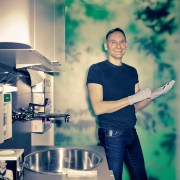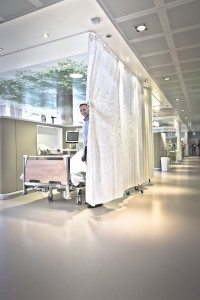As an HIV carer, you advise people with HIV on a daily basis and know all the information from the glossy brochures by heart. But what happens if such a professional becomes infected with HIV themselves? What does that mean for their credibility and the decisions they make in their job? Loek Elsenburg, HIV nurse at the VU University Medical Centre (VUmc) and the Jan van Gooyen Medical Centre, was faced with these questions. From Wiggert van der Zeijden for the HIV magazine hello gorgeous.

Loek Elsenburg has a fantastic job, he says, and it's written all over his face. In 2005, however, he was still working in management at Vumc. "That wasn't the right place for me. It was one of those green table positions where you make decisions that you never really get to see the impact on people." At the time, Loek happened to speak to one of the HIV nurses at the hospital and mentioned that he used to work as an HIV buddy in Rotterdam. The nurse told him that many positive people came to the clinic, and that's when it clicked for Loek - one of those moments when everything suddenly became clear. Loek was asked if he would like to take on one of the counselling shifts for a while, and a short time later he was a full-time HIV nurse himself. He has now been doing the job for eight years, and for the past three years he has also been offering rapid HIV tests at the Jan van Goyen Medical Centre in Amsterdam. Loek is also on the board of the Dutch HIV Association (HVN).
"In my profession, you don't have a solution for everything, but you can help to bring some order to the chaos. With this in mind, I offer confidential counselling for my clients. I respond to their needs, reflect what they are thinking and share their emotions in a constructive way."
People with HIV have to ask themselves one question again and again: Should I tell others or should I keep it to myself? Talking about it at home, at work or at school is often seen as a big taboo. "Many of my clients live with a big secret," says Loek. "They don't dare to tell the people in their immediate environment that they are HIV-positive. Heterosexual men with HIV in particular often feel lonely as a result. Gay men, on the other hand, tend to talk about it more openly, perhaps also because they have usually already come out. Gay men are also better informed. Heterosexual men prefer to keep the counselling session as short as possible. They're happy when it's over and they can go home."
Loek also has a lot to do with heterosexual men and women at the Jan van Goyen Medical Centre. He carries out rapid HIV tests there, the results of which are available after around 20 minutes. "People with an increased risk of HIV can also take a rapid test at the local health centre, but everyone else is usually referred to their GP. However, some straight people prefer to come to us because they feel more anonymous and protected here. That shows how big the stigma around HIV still is."
Loek has already experienced a lot in his work. It is always difficult to have to tell someone about a positive HIV test result, but the consequences are much more severe if someone does not seek treatment. "For a small minority of patients, it is so difficult to accept their HIV status that they simply block out all information, don't take their tablets regularly or even refuse treatment altogether. I've seen people die who could easily have survived. That still happens today."

A few years ago, Loek's own health also deteriorated. He had several appointments with his GP, but was not always completely open with them, as he admits. And so they did talk about his complaints and the possible causes, but without addressing this one particular one. "I know this from my patients and also experience it with my contacts in the scene: the ability to not let something get to you, the tendency to bury your head in the sand so as not to admit that you've taken risks, even though you know exactly what they are." Eventually, one of Loek's colleagues asked him whether he should take a test himself. "That hit me incredibly hard," says Loek, "but of course it was exactly what I needed."
The result was clear: Loek was HIV-positive. "I was so ashamed," he says. "That I, as a professional, hadn't managed to prevent it. Because I, an HIV carer, had been infected, I felt like a failure. Yet I had so often discussed with friends how important it is to accept your own mistakes. And of course, guilt is also deeply rooted in all religions that help shape our identities. In the end, it came down to the question of whether I could forgive myself. Today I am very aware that life doesn't always go according to plan."
Suddenly Loek was faced with the question himself: Should I tell others or keep it to myself? He had started treatment quickly, his health had improved rapidly and he was doing HIV counselling again. Nevertheless, something was different, and that had a lot to do with his patients. "In some ways, everything was the same as before, but I felt more and more uncomfortable when patients confided their innermost thoughts and worries to me. Yes, I felt like a hypocrite. I insisted that they were honest with me, but I was hiding something very important from them myself."
"Of course, in a medical context, talking to patients about your own situation is not at all acceptable. It's a very hierarchical world in which it's considered a sign of professionalism to keep work and private life clearly separate. They call this 'professional distance'. And there are indeed risks. You don't want patients, who can be very manipulative, to misuse this information. And of course you also don't want a counselling session to suddenly turn into something like a self-help group. Nevertheless, I increasingly felt the need to be open about my own status and I also talked about it with my colleagues and other employees."
Ultimately, this led to a change that made him happier in the long term. "I made the decision to gradually tell my patients about myself whenever it seemed suitable and appropriate, and they really responded very well and warmly. And the whole thing had another positive effect: my patients suddenly became discussion partners and we met as equals. People who come here are often at their wit's end, so to speak. And I can then tell them about my own fears and doubts, but also about the decisions I have made, which have all turned out to be good. And when I tell them that I couldn't tell my GP everything either and how ashamed I was, they seem to be able to open up more easily."
Today, Loek also talks about his experiences in workshops and coaching sessions, for example at the HIV Association or at ACTA, the Amsterdam Dental Academy. Recently, a student asked him whether he had to teach his clients safer sex. "That question made me feel very uncomfortable," says Loek. "That did it. But I've learnt a few lessons in life. For example, about the power and benefits of acceptance, about giving up prejudices and preconceived ideas. Every patient has to deal with this, and I'm glad that I can share my experiences with them."
Many thanks to editor Leo Schenk, Wiggert van der Zeijeden and Henri Blommers for permission to publish
(Photos: Henri Blommers; translation of the English version: Holger Sweers.)









